RiseSun Real Estate Development Bundle
Can RiseSun Real Estate Navigate China's Shifting Sands?
The Chinese real estate market is a dynamic arena, and RiseSun Real Estate Development SWOT Analysis reveals the company's position within it. Established in 1996, RiseSun has evolved from a property developer to a multifaceted enterprise. Its journey, marked by both triumphs and setbacks, offers a compelling case study in strategic adaptation within a volatile industry.
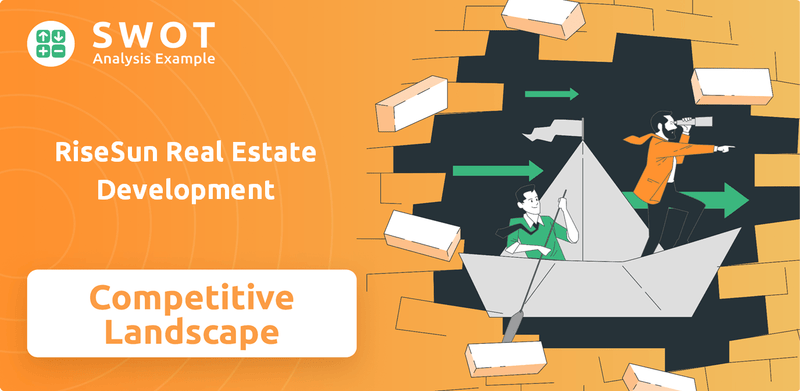
This analysis delves into the competitive landscape of RiseSun, examining its market share, recent acquisitions, and project pipeline. We'll dissect the company's financial performance, including its 2024 losses, and explore its development strategy. Furthermore, we'll provide a thorough market analysis, considering industry trends and RiseSun's property portfolio to assess its future outlook and potential investment opportunities.
Where Does RiseSun Real Estate Development’ Stand in the Current Market?
RiseSun Real Estate Development Co. Ltd. operates primarily in the Chinese real estate market, focusing on developing and selling residential and commercial properties. Its portfolio includes urban housing, tourism real estate, healthcare properties, and industrial parks. The company's core business revolves around real estate development and sales, with diversification into property management, hotel management, and commercial operations.
The company's value proposition centers on delivering diverse real estate solutions across multiple sectors, aiming to cater to various customer needs within China. While specific market share data isn't available, RiseSun is considered a significant player in a highly competitive and regulated market. The company's primary focus remains on developing and selling properties, which generates the bulk of its revenue.
RiseSun's financial performance has been mixed. For the trailing 12 months ending March 31, 2025, the company reported revenue of $4.7 billion. However, the company faced a projected net loss of 7.2-9.5 billion yuan for 2024, contrasting with past profits. The return on capital (ROC%) was 0.01% as of March 2025, and the WACC was 7.12%, indicating value destruction as it grows.
The revenue breakdown reveals the importance of residential buildings, which accounted for 86.8% of rental income. Industrial sites contributed 7.5%, commercial premises 1.6%, and hotels 1%. This highlights the company's reliance on residential property sales and rentals. The company has diversified into property management, hotel management, and commercial operations, but its core remains real estate development and sales.
The Chinese real estate market has been experiencing downturns. Total sales of the top 100 developers decreased by 5.9% year-on-year in the first two months of 2025. Investment in real estate development nationwide fell by 9.8% year-on-year from January to February 2025. These broader market conditions significantly impact RiseSun's positioning and financial results. For more detailed insights, see Growth Strategy of RiseSun Real Estate Development.
RiseSun's market position is substantial, but it faces challenges due to the current market downturn. The company's financial performance reflects these difficulties. The competitive landscape includes numerous other real estate development companies in China. The company's future outlook will depend on its ability to navigate these market conditions and adapt its strategies.
RiseSun's market position is significant within the Chinese real estate sector, but it is currently facing financial and market challenges. The company's core business is real estate development and sales, with diversification into related services. The broader market downturn impacts its performance.
- The company reported revenue of $4.7 billion for the trailing 12 months ending March 31, 2025.
- A projected net loss of 7.2-9.5 billion yuan for 2024 was reported.
- Residential buildings accounted for 86.8% of rental income.
- The Chinese real estate market has seen a decline in sales and investment.
RiseSun Real Estate Development SWOT Analysis
- Complete SWOT Breakdown
- Fully Customizable
- Editable in Excel & Word
- Professional Formatting
- Investor-Ready Format
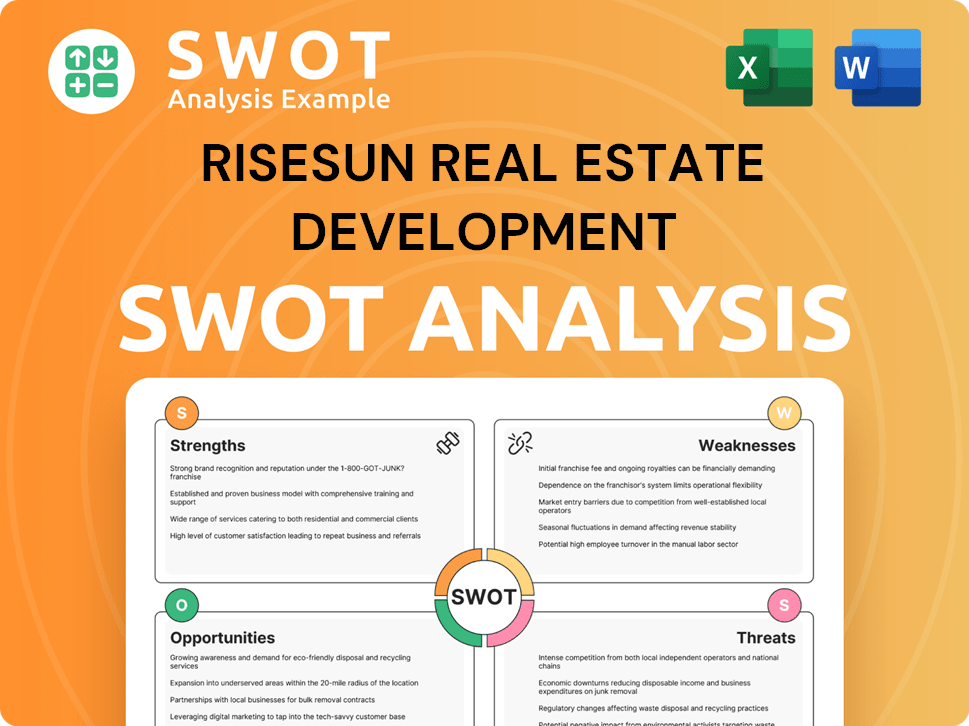
Who Are the Main Competitors Challenging RiseSun Real Estate Development?
The competitive landscape for RiseSun Real Estate Development Co. Ltd. in China is intense, with numerous players vying for market share. This environment is shaped by both direct competitors in real estate development and broader economic trends influencing the property market. Understanding these dynamics is crucial for assessing RiseSun's position and future prospects.
RiseSun faces competition from a mix of state-backed developers and private enterprises. These competitors leverage various strategies, including large-scale projects, financial strength, and government support, to gain an edge. The overall market conditions, including pricing and sales volumes, significantly impact all companies operating within the sector.
The Chinese real estate market is currently experiencing a downturn, creating challenges for RiseSun and its competitors. Factors such as declining new home prices and reduced sales volumes are affecting the financial performance of many developers. The government's policies also play a crucial role, potentially favoring state-owned entities.
RiseSun Real Estate faces competition from major developers like Poly Developments and Holdings Group Co. Ltd., China Vanke Co. Ltd., and Longfor Group Holdings Ltd.
Poly Developments and Holdings Group Co. Ltd. had a market cap of $15.43 billion, China Vanke Co. Ltd. at $13.45 billion, and Longfor Group Holdings Ltd. at $8.33 billion.
China Vanke reported a net loss of 49.48 billion yuan for 2024, reflecting the tough market conditions.
New home prices have fallen for 21 consecutive months as of February 2025, dropping 5.2% annually.
Government policy relaxations are expected to benefit upper-tier markets and state-owned developers, potentially widening the gap between state-backed and private entities.
Total sales of China's top 100 developers slid 5.9% year-on-year in the first two months of 2025, indicating overall market weakness.
The competitive landscape of RiseSun Real Estate is influenced by the performance of its rivals, broader market trends, and government policies. To better understand how RiseSun navigates this landscape, consider exploring the Marketing Strategy of RiseSun Real Estate Development.
RiseSun's ability to compete depends on several factors, including project quality, financial health, and land acquisition strategies. Understanding these elements is crucial for evaluating its position in the market.
- Financial Strength: Competitors' financial stability and access to capital.
- Project Portfolio: The diversity and quality of projects offered by competitors.
- Land Acquisition: The ability to secure prime land for future developments.
- Market Positioning: How competitors target specific customer segments.
RiseSun Real Estate Development PESTLE Analysis
- Covers All 6 PESTLE Categories
- No Research Needed – Save Hours of Work
- Built by Experts, Trusted by Consultants
- Instant Download, Ready to Use
- 100% Editable, Fully Customizable
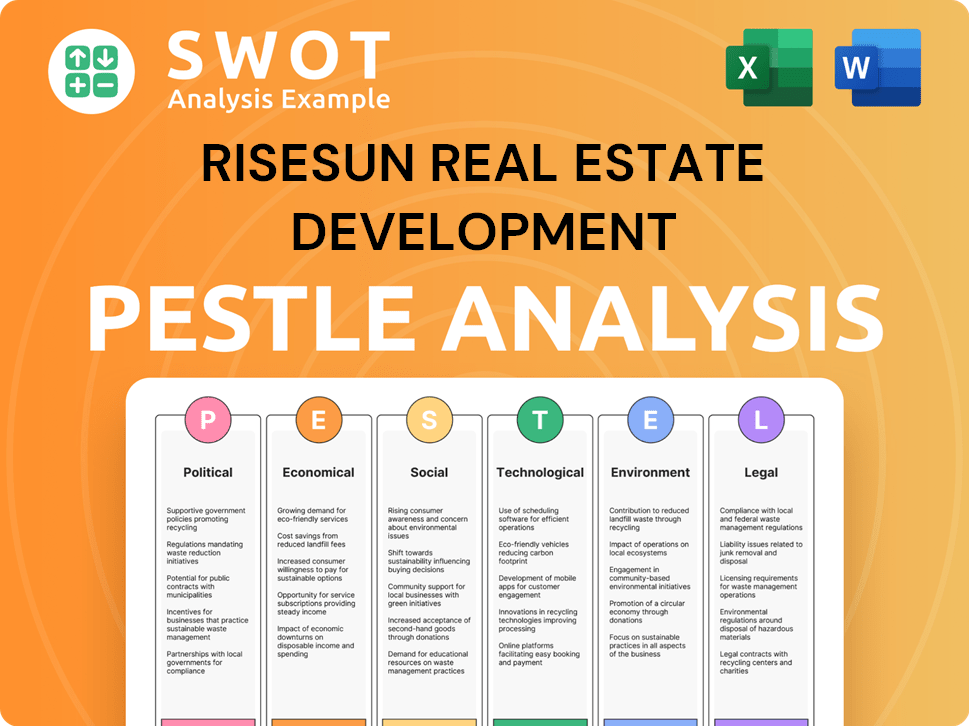
What Gives RiseSun Real Estate Development a Competitive Edge Over Its Rivals?
The competitive landscape for RiseSun Real Estate Development Company is shaped by its strategic initiatives and operational strengths. RiseSun distinguishes itself through a diversified business model, extending beyond traditional property development. This approach includes property management, hotel management, commercial operations, and investment management, creating a robust business ecosystem that generates steady income streams. This diversification is a key element in its competitive advantage within the real estate development industry.
RiseSun's focus on innovation, particularly in smart building solutions and sustainable practices, further enhances its competitive edge. The company's investments in smart technology and green building certifications align with evolving consumer preferences. These initiatives not only improve operational efficiency but also contribute to the company's sustainability goals, which are increasingly important in the current market climate. The company's strategic approach to land acquisitions and project selection enables it to adapt quickly to changing market dynamics.
RiseSun’s ability to capitalize on China's urbanization trends and changing market demands is a crucial factor in its success. The company's focus on mid- to high-end projects, combined with a keen eye for market demand, enables it to maintain a strong position. However, the sustainability of these advantages faces threats from imitation and broader industry shifts. For more insights into the company's ownership structure, you can explore Owners & Shareholders of RiseSun Real Estate Development.
RiseSun's diversified approach includes property management, hotel management, commercial operation, and investment management. This strategy creates multiple revenue streams and reduces reliance on initial property sales. Rental income breakdown as of December 2024 shows residential buildings at 86.8%, industrial sites at 7.5%, commercial premises at 1.6%, and hotels at 1%, highlighting a broad portfolio.
The company invested $10 million in proprietary smart technology systems in 2024, anticipating a 20% enhancement in operational efficiency. Its 'Smart Living' initiative in 2024 involved equipping 5,000 smart homes with IoT devices, leading to a 20% improvement in energy efficiency. Over 70% of RiseSun's projects were certified green buildings as of 2024.
RiseSun focuses on mid- to high-end projects and strategically acquires land to meet market demands. This approach allows the company to adapt swiftly to changing market dynamics and capitalize on China's urbanization trends. The company's ability to identify and respond to market needs is a significant advantage in the competitive landscape.
RiseSun's competitive advantages include a diversified business model, focus on innovation, and strategic market positioning. These factors contribute to its ability to generate steady income, enhance operational efficiency, and align with consumer preferences for sustainable and technologically advanced properties. This positions RiseSun well within the real estate development company sector.
RiseSun's competitive strengths include a diversified business model, innovative smart building solutions, and a commitment to sustainability. The company's strategic land acquisitions and focus on mid- to high-end projects enable it to capitalize on market trends. These advantages are critical in the competitive landscape of the real estate development company.
- Diversified Business Model: Multiple income streams.
- Smart Building and Sustainability: Enhances efficiency and meets consumer preferences.
- Strategic Market Positioning: Adapts to changing market dynamics.
- Focus on Mid- to High-End Projects: Targets profitable segments.
RiseSun Real Estate Development Business Model Canvas
- Complete 9-Block Business Model Canvas
- Effortlessly Communicate Your Business Strategy
- Investor-Ready BMC Format
- 100% Editable and Customizable
- Clear and Structured Layout
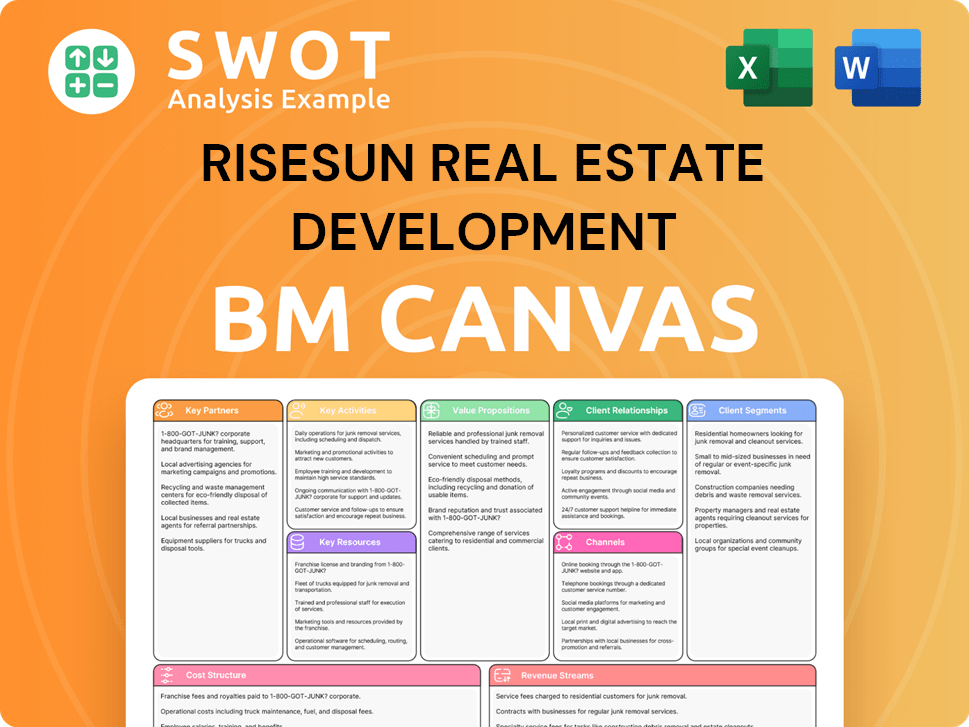
What Industry Trends Are Reshaping RiseSun Real Estate Development’s Competitive Landscape?
The competitive landscape for RiseSun Real Estate Development Company is currently shaped by a challenging market environment. The Chinese real estate market faces a significant downturn, impacting the company's financial performance. A detailed analysis of RiseSun's business model reveals the pressures from declining sales and evolving consumer preferences.
The industry's future outlook hinges on navigating economic uncertainties, adapting to technological advancements, and responding to regulatory changes. RiseSun must strategically position itself to capitalize on emerging opportunities while mitigating risks associated with the volatile property market.
The Chinese real estate sector is experiencing a downturn, with new home prices falling for the 21st consecutive month in February 2025. Investment in real estate development decreased by 9.8% year-on-year from January to February 2025. Digital transformation and smart building solutions are becoming increasingly important for property marketing and management.
RiseSun faces challenges including the ongoing market downturn and managing potential debt maturities. The company reported a net loss of 7.2-9.5 billion yuan for 2024. Adapting to evolving consumer preferences for sustainable and smart properties is crucial for future success.
Opportunities for RiseSun include expanding into new markets and property types. The build-to-rent market is projected to grow by 20% annually through 2025, reaching $85 billion. Adaptive reuse of commercial spaces presents further avenues for diversification.
RiseSun needs to focus on innovation, sustainable development, and strategic land acquisitions. Careful financial management is essential amidst the ongoing industry restructuring. This includes navigating the current market and capitalizing on future investment opportunities.
RiseSun's ability to navigate the competitive landscape depends on several key factors. These include adapting to market dynamics, focusing on sustainable practices, and managing financial health. Strategic decisions will determine its long-term success in the real estate market.
- Adapting to market fluctuations and consumer preferences.
- Embracing technological advancements in property management and marketing.
- Focusing on sustainable and energy-efficient properties.
- Managing financial risks and debt effectively.
RiseSun Real Estate Development Porter's Five Forces Analysis
- Covers All 5 Competitive Forces in Detail
- Structured for Consultants, Students, and Founders
- 100% Editable in Microsoft Word & Excel
- Instant Digital Download – Use Immediately
- Compatible with Mac & PC – Fully Unlocked
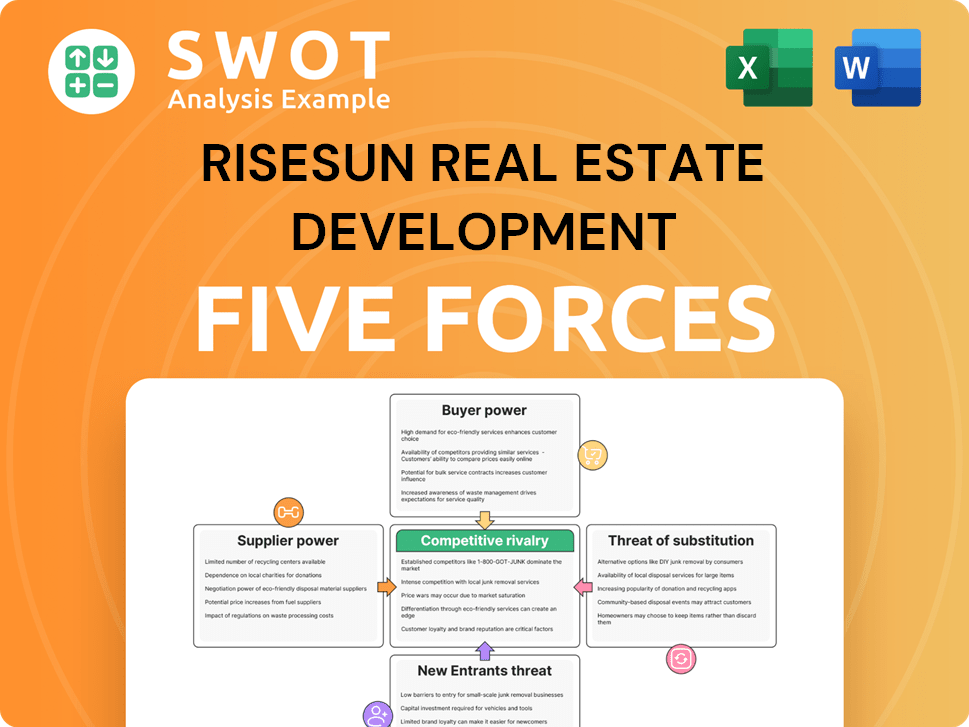
Related Blogs
- What are Mission Vision & Core Values of RiseSun Real Estate Development Company?
- What is Growth Strategy and Future Prospects of RiseSun Real Estate Development Company?
- How Does RiseSun Real Estate Development Company Work?
- What is Sales and Marketing Strategy of RiseSun Real Estate Development Company?
- What is Brief History of RiseSun Real Estate Development Company?
- Who Owns RiseSun Real Estate Development Company?
- What is Customer Demographics and Target Market of RiseSun Real Estate Development Company?
Disclaimer
All information, articles, and product details provided on this website are for general informational and educational purposes only. We do not claim any ownership over, nor do we intend to infringe upon, any trademarks, copyrights, logos, brand names, or other intellectual property mentioned or depicted on this site. Such intellectual property remains the property of its respective owners, and any references here are made solely for identification or informational purposes, without implying any affiliation, endorsement, or partnership.
We make no representations or warranties, express or implied, regarding the accuracy, completeness, or suitability of any content or products presented. Nothing on this website should be construed as legal, tax, investment, financial, medical, or other professional advice. In addition, no part of this site—including articles or product references—constitutes a solicitation, recommendation, endorsement, advertisement, or offer to buy or sell any securities, franchises, or other financial instruments, particularly in jurisdictions where such activity would be unlawful.
All content is of a general nature and may not address the specific circumstances of any individual or entity. It is not a substitute for professional advice or services. Any actions you take based on the information provided here are strictly at your own risk. You accept full responsibility for any decisions or outcomes arising from your use of this website and agree to release us from any liability in connection with your use of, or reliance upon, the content or products found herein.